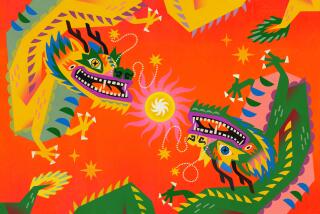SCIENCE / PSYCHOSOMATIC MEDICINE : Study Shows New Evidence of Mind-Body Link
Chinese-Americans who have a combination of disease and birth year that traditional Chinese astrology and medicine consider ill-fated die an average of one to five years earlier than Anglos with the same combination, according to a new study by researchers at UC San Diego.
The study provides new evidence of the role of the mind in controlling the body’s susceptibility to disease, and in particular the life-shortening effects of despair and stoicism, according to its author, Dr. David P. Phillips of UCSD.
Phillips and his colleagues report tomorrow in the international medical journal the Lancet that they studied the California death certificates of 28,189 adult Chinese-Americans and compared the age of death to that of 412,632 whites dying in the same years and of the same diseases.
They found that Chinese cancer patients born in “earth” years died an average of 3.3 years earlier than Anglos, while those suffering heart attacks died 2.45 years earlier.
“Our data show that the more strongly a group is attached to Chinese traditions, the more years of life are lost by those having these ‘ill-fated’ disease-birth year combinations,” Phillips said. “Our results hold . . . for nearly all major causes of death studied.”
Each birth year is associated with one of five phases or elements, depending on the last digit. Birth years ending in 0 or 1 are associated with metal, 2 and 3 with water, 4 and 5 with wood, 6 and 7 with fire, and 8 and 9 with earth. Similarly, each phase is associated with a particular organ or symptom--such as fire with the heart and earth with lumps, nodules and tumors.
A person born in the fire year of 1907 would be considered especially vulnerable to heart disease. If that person then develops heart disease, the traditional prognosis is for rapid death.
That belief may, in itself, hasten death, Phillips said. “When a person contracts a disease which is associated with the phase of his birth year, he may be more likely than others to feel helpless, hopeless or stoic. Past research has linked these psychological states to reduced survival times.”
Similar results were also found for 2,000 Vietnamese-Americans, who share the same astrological beliefs, Phillips said, but the data was not included in the Lancet paper for space reasons.
Phillips and his colleagues were not able to determine specifically whether any of the individuals in the study held the traditional beliefs. They did, however, restrict the study to people over the age of 18 because they were more likely than younger people to be familiar with the tradition.
Preliminary reaction to the paper was mixed.
“This research represents an important contribution to psychosomatic medicine and complements earlier findings,” said Dr. Claran A. O’Boyle of the Royal College of Surgeons in Ireland.
But Dr. Zheng Ming Chen, a Shanghai-born epidemiologist at Oxford University, told the Associated Press that he found the findings difficult to accept. “They assume that people attach things to certain religious or traditional beliefs . . . (but) only a very small percentage of people are keen on this,” he said.
Most researchers, however, have not yet seen the results, which fall into line with a large body of literature suggesting that a patient’s emotional outlook plays a crucial role in the length of their survival with a serious disease. Dr. David Spiegel of Stanford University has reported recently, for example, that breast cancer victims who undergo group therapy to improve their emotional outlook live an average of 18 months longer than those who do not. Dr. Fawzy I. Fawzy of UCLA has reported similar results with malignant melanoma.
Phillips’ says his results suggest that emotional outlook is important for reducing survival in most fatal diseases.
Phillips has conducted a number of studies using California death certificates from 1969 to 1990. California death certificates contain more information about causes of death than those from other states.
He has found, for instance, that there are fewer deaths immediately before major holidays and more afterward, suggesting that people can will themselves to survive through such major events. He has also found that both sexes are more likely to commit suicide in the year of a symbolically meaningful, “stock-taking” birthday--ages ending in 0 or 5.
Chinese astrology and traditional Chinese medicine would appear to be a particularly fertile area for such studies, he said, because they are based on the belief that a person’s fate is indelibly associated with the birth year.
The effect in the study was related strictly to ill-fated combinations of disease and birth year. Chinese-Americans with a disease not linked to their birth year lived as long as whites with the same disease.
The magnitude of the effect also depends upon the depth of the individual’s immersion into the traditional culture. The effect is greater for women than for men because they are less exposed to Western influences, Phillips said. It was also greater for individuals whose families would not permit a post-mortem examination of the body, which is forbidden by Chinese tradition.
O’Boyle speculates that Phillips’ subjects might have lived substantially longer if they could have been given effective behavioral therapy when their diseases were diagnosed. Echoing the Greek physician Hippocrates, he concludes that “Adequate medical care requires treatment not only of the disease itself but also of the patient.”






